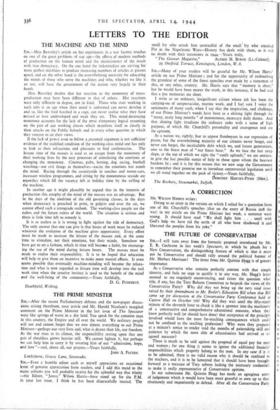THE MACHINE AND THE MIND
LETTERS TO THE EDITOR
Sig,—Miss Reaveley's article on her experiences in a war factory touches on one of the great problems of our age—the effects of modern methods of production on the human mind and the inconsistency of the result with true democracy. On the one hand the industrialists are striving for more perfect machines to produce increasing numbers of articles at greater speed, and on the other hand is the overwhelming necessity for educating the minds of those who serve the machines and who, whether we like it or not, will have the government of the nation very largely in their hands.
Miss Reavelgy doubts that her reaction to the monotony of mass- production may have been different to that of others. Her reactions were only different in degree, not in kind. Those who start working in such jobs at an age when their mind is unformed can never develop it and so, like the bird hatched in a cage, can never realise what they have missed or how undeveloped and weak they arc. This mind-destroying monotony accounts for the lack of the most elementary logical reasoning on the part of Our working classes which manifests itself so clearly in their attacks on the Public Schools and in every other question in which they venture to air their views.
If the lack of power even to follow a reasoned argument is not sufficient evidence of the stultified condition of the working-class mind one has only to look to their relaxations and pleasures to find confirmation. The leisure time of the masses is used as an escape from the monotony of their working lives by the easy processes of stimulating the emotions or changing the monotony. Cinemas, pubs, betting, dog racing, football watching—not evil things in themselves—excite the emotions but numb the mind. Racing through the countryside in coaches and motor-cars, incessant wireless programmes, and sitting by the monotonous seaside are soporifics which fill the vacancy left at holiday time by the stilling of the machine.
In another age it might plausibly be argued that in the interests of production this atrophy of the mind of the masses was an advantage. But In the days of the abolition of the old governing classes, in the days when democracy is preached in print, in pulpits and over the air, we cannot afford such a retrograde outlook. The working-class people are the rulers and the future rulers of the world. The situation is serious and there is little time left to remedy it.
It is as useless as it is wrong tq fight against the tide of democracy. The only answer that one can give is that hours of work must be reduced wherever the evolution of the machine gives opportunity. Every effort must be made to increase the leisure of the masses and, at the same time to stimulate, not their emotions, but their minds. Somehow we have got to set a fashion, which in time will become a habit, for encourag- ing the use of the mind during leisure hours. The masses must be made to realise their responsibility. It is to be hoped that education will help to give them an incentive to make more mental efforts. It even seems possible that eventually machine-minding will become the relaxa- tion and what is now regarded as leisure time will develop into the real work time when the creative instinct is qsed to the benefit of the mind and the well-being of the community.—Yours faithfully,


























 Previous page
Previous page